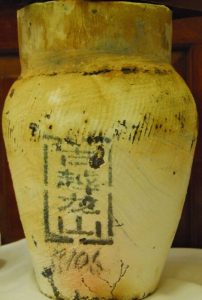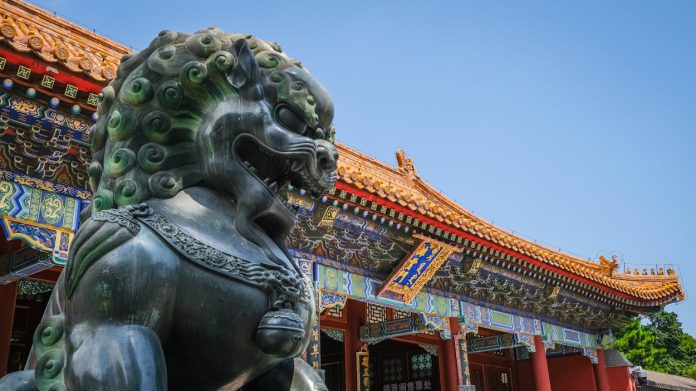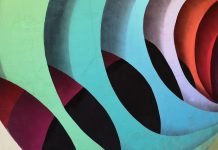In the morning, Fang Xuan-ling, a minister of the new Tang Dynasty, would be starting on his journey back to the court in Chang’an. The leave he had been granted for a brief stay in Chiangling to visit the retired peasant sandal-maker and poet Chen Hsi-wei had proved rewarding. Each night he added to his journal what he had learned about Hsi-wei’s poems during the day, especially the origins of the poet’s verses. The governor of Chiangling, an insecure leftover from the former regime, was terrified of Fang. Therefore, with three exceedingly low bows, he insisted the minister take over the best suite in his villa, be fed delicacies, and enjoy the free use of his coach, horses, and an escort for the daily three-li commute to and from Hsi-wei’s first and last home. The cottage was ostensibly a gift from the former governor but really from that philistine’s wife, Lady Bao. When her husband died, she was free to do many things, including paying visits to Hsi-wei. On her first visit, she was horrified by the cottage’s tiny size and poor condition. It was nothing like the decent villa her husband had told her he had furnished the poet and sandal-maker. On her second visit, she brought workmen to repair the roof, replace the warped boards, and paint everything. Like Minister Fang, she found that she enjoyed Hsi-wei’s company as much as she always had his poems.
As a rule, Fang Xuan-ling arrived late in the morning. He always brought a modest but delicious lunch from the governor’s kitchen and would leave at sundown. But, as this would be his final visit, Fang ordered up a five-course dinner and appropriated two jugs of the governor’s best wine.
The early autumn afternoon was temperate, and the two men spent it in Hsi-wei’s little patio chatting amicably. It was a desultory conversation that ran through topics ranging from the changes in the capital, which Sui officials had kept their posts, to the achievements of Emperor Wen and the excesses of his successor—his son and probable murderer—Yangdi. Fang also discussed Yangdi’s poetry which was much praised but which he did not like. He judged the late emperor’s verses formulaic, conventional, adding that they seemed to him to have been written out of vanity rather than inspiration. Hsi-wei simply smiled then asked if the new regime would retain Wendi’s land reforms and uphold the reinstitution of the examination system. Fang said he was sure both would be preserved, the army reorganized, and the Grand Canal would be extended. He also told Hsi-wei about some promising inventions he had heard of in the capital, including gas heating and gunpowder. But the novelty that excited the poet was a new form of woodblock printing.
“Characters are carved into small blocks that can be moved. In this way, any text can be printed in many copies. That would include your poems, Master Hsi-wei,” Fang said graciously. “No more copying by hand, one at a time, often badly and with errors.”
When dinner was heated up by Fang’s servant and the two jugs of wine produced, the minister asked if Hsi-wei had ever written a poem about wine.

“It’s a classical theme,” he said, “a traditional one.”
“It is, yes. Let me think. Well, in fact one of my earliest efforts had to do with wine poetry.”
“Really? I’ve never seen it.”
“Nor has anyone else. As I said, it was an early attempt and not a good one.”
“You still have it?”
Hsi-wei reluctantly admitted that he did.
“I would very much like to read it.”
Hsi-wei frowned. “Very well, my lord. But, as you are always curious about how I came to write my verses, I’ll tell you how that poor poem came about. You’ve stirred old memories.”
Fang refilled both their cups. “Good. Let’s have the story first, then the poem, and wine with both.”
Hsi-wei took a sip of wine, put down his cup, and rubbed his chin. “Perhaps you’ll remember my teacher, Master Shen Kuo? I believe I’ve mentioned him more than once.”
Fang pretended to look puzzled. “Would that be the teacher who called your writing bird’s-foot scratching? The stern teacher of the sons of the nobility who resented being saddled with a peasant boy—and by the First Minister? Would that be the Master Shen Kuo who beat, berated, and belittled you? That Shen Kuo?”
Hsi-wei looked down, embarrassed. “Have I complained that much?”
Fang was amused. He laughed as one can at the pains of others or even one’s own so long as they are far enough in the past. “Well, you didn’t do it all at once, Master Hsi-wei.”
“I’m sorry all the same. I owe much to Shen Kuo. When I heard that he had died, I tried to attend the funeral but arrived too late. I visited his grave.”
“I didn’t know that.”
“It doesn’t matter. But here is the story of how I came to write my juvenile wine poem. One day, Master Shen was tipped off by one of my fellow students that I had not just been copying out the Shijing poems as I was supposed to be doing but had been making up verses of my own. At first, he was furious. He beat me harder than ever and called me even worse names. But, two days later, he demanded that I show him all the poems I had written. There were about six of them, I think.”
“And one was about wine?”
“No, my lord, not yet. As best I can remember, they were about my adventures as a courier in the south, about the gardens of Daxing, about my village and its famous ducks.”
“Famous ducks. And did Master Shen ridicule those early poems? Did he humiliate you in front of the other students?”
“Strangely, no. In fact, he saw some advantage in my poor efforts—to himself, that is. He had my verses copied and circulated at court. The point was not to brag about my poems but what an extraordinary teacher he was, one who could make an illiterate peasant capable of writing verses. It didn’t matter if they were bad.”
“I see. Did he treat you any better after that?”
“Not really. After all, I was still a peasant and, as he told me, akin to a dog who’d learned to sit up, roll over, and fetch sticks. To be fair, there were fewer beatings. Also, he gave me a spare scroll, saying I could use it for my clumsy verses with all the barbarous idioms and outlandish words I’d picked up in the south.”
Fang smiled. “Famous ducks and southern turns of phrase. I see. Do go on, please.”
“Well, about that time the First Minister held a banquet in honor of a visit by the Duke of Liang. The Duke was known to be fond of the classics, and he was also the patron of Yan Shubao. Perhaps you know Yan’s peony poems? They were highly rated at the time.”
“I’ve read them,” said Fang indifferently.
“Well, Yan Shubao was to be in the Duke’s entourage. Master Shen was surprised and thrilled to receive an invitation to this banquet. But he was not wholly pleased.”
“And why was that?”
“Because the invitation came with a condition. He was to bring me with him. It appeared the First Minister had seen my poems and wanted to see me as well.”
Fang chuckled and poured them both more wine. “I’m imagining your teacher’s feelings. I’m trying to picture his face.”
Hsi-wei grinned. “Yes, it truly was something to behold. He was like a peasant pulled one way by his plow and another by his donkey. Of course, there was no question of my having to go. Master Shen gave me strict instructions on how I was to behave—how to eat and how, if spoken to, I was to address this officer or that deputy minister. He warned me not to behave familiarly with the servants, even if they were peasants like me. But, above all, he charged me to keep my mouth shut unless I was addressed or eating. I was also bidden to do the latter in moderation and not stuff myself like the uncouth lout I was, also to accept no more than one cup of wine.”
“In which room was the banquet?”
“I expect it was called the Red Room because the walls were bright red and the carpet scarlet and gold. I remember it as a narrow room with a long table.”
“I’ve been there. It’s quite splendid and still bright red. Was the company large or small?”
“There must have been about thirty men there and some had brought their wives or perhaps favorite concubines. The women were elaborately coiffed and richly dressed. The way they looked at one another made me think it was for each other they’d put on such finery. The First Minister presided, of course, an impressive man, but he seemed less tall than when I’d last seen him.”
Fang chuckled “That was because you had grown taller, Hsi-wei, while he had not.”
“Just so. I was fourteen when I returned from the south, and that was two years earlier. Well, as it happened, the First Minister did summon me. As I stood beside him, he told the company the story of my carrying a crucial message to the south. He called it a vital contribution to the war’s success and that I had therefore been instrumental in uniting China after three hundred years. He was exaggerating, of course, for the sake of the story. But he went on, telling how I had turned down the usual rewards and begged instead to be educated, to be able to read words like those of the message that had been inscribed on my scalp. He said the court was astonished that a peasant boy would ask such a thing. So, he sent me to the strictest teacher he knew, sure I would soon change my mind. Then he asked that teacher to stand, which Shen Kuo did wearing a broad smile that he turned this way and that so everybody could see it before bowing low to the First Minister. To cap off this embarrassing episode, the First Minister announced that I had not only studied Qu Yuan and the Shijing masters but was now writing poetry of my own.”
“Did he ask you to speak? Did he have you recite a poem?”
“Fortunately, no, much to my relief. I expect that of my teacher was even greater. For Master Shen, I was a kind of advertisement, an exhibit. And, if the First Minister had read those first poems of mine, I expect he thought it best not to have one recited. Anyway, I’m sure I would have been tongue-tied.”
“And what about the wine?” asked Fang, again filling their cups.
“I’m coming to that, my lord.”
“Very well. I’ll be patient. Tell it your way.”
“When I was a boy, my mother said that I was given two ears and one mouth so that I would listen twice as much as I would speak. Well, I kept my mouth shut that night but my ears open. The dinner conversation began, so far as I can recall, as a mixture of diplomatic talk among the higher-ups and gossip among the less exalted. Wine was dispensed generously and that eventually led to the topic that dominated the evening. It was the visiting Duke who started it. Getting to his feet and raising his cup, he delivered a speech about the kinship between fine wine and fine poetry. Everyone had to listen, of course, though it was a rather long speech and rather pedantic. The duke began with history. He explained how the ancients first made beer by steaming grains then adding gu for fermentation and to produce sugar. It was a crude drink, brutal he called it, consumed warm. It made our ancestors drunk but inspired no poetry. Then, he said, two thousand years ago, in the glorious reign of the Yellow Emperor, one of his ministers discovered the secret of making wine. This was Du Kang, which is why the best yellow wine—such as what they were all guzzling—is called after him.”
Fang shrugged. “Many say Du Kang and the Yellow Emperor are only legends. But the speech does sound tedious.”
“It was; but the Duke was the guest of honor and a duke, so everybody was quiet and looked attentive. When he finally finished, the First Minister claimed to be astonished by such erudition. The Duke nodded to acknowledge the compliment, but, before sitting backdown, he asked his court poet, Yan Shuboa, to speak about the relationship between wine and poetry, which he grandly called the two pillars of civilization. The company was not happy about this, and they may not have been more engaged by what Master Yan had to say than they were by his benefactor’s lecture; however, I was. Yan spoke about two of our greatest poets, Cao Cao and Tao Yuanming, whose work I had, of course, been studying.”
“Ah, of course. The poets of wine.”
“I expect you know Cao Cao’s ‘Short Song Style.’
“Required reading in my house. I once had it by heart. Let me think. Doesn’t it begin like this:
The melancholy my heart begets
Comes from cares I cannot forget…?”
“Yes, that’s it, and it closes with these lines:
What can unravel these woes of mine?
I know but one drink—Du Kang wine.
Yan said that, for Cao Cao, wine was consolation, forgetfulness, a respite rather than a fount of inspiration. He said the famous short song is not about wine at all, which is obvious from its somewhat opaque conclusion.”
“Remind me how it ends.”
“With pleasure.
Mountains weary not of their heights,
Oceans weary not of their depth.
The sage pauses when guests call,
So at his feet the empire does fall.”
“How do you understand that”
“As expressing a preference for wisdom over power, its greater durability as he compares sages to the immovable mountains and the unfathomable sea. What do you think, my lord?”
“That your interpretation is as good as any.”
“There are, of course, others.”
“Such as?”
“Well, for instance there’s the usual political one, my lord.”
“An empire falling?”
“Remember those ‘cares.’ Cao Cao was a warlord who bullied his way to dominating the Han government. In his time, he was more notorious for his cruelty, limitless ambition, and betrayals, than for his poems. The poem could be a protest, the wish of a sage to outstrip and outlast worldly power. It might be the longing of a violent man too intelligent man not to be repulsed by violence.”
“Why would you think that?”
“Because of his poem, ‘To My Wine.’”
“Refresh my memory, please.”
“The poem describes a perfected empire, one that never existed—at peace, virtuous, well governed, prosperous, and just:
…where officers shall not appear at the door.
From dukes down to viscounts
All love the common people…
All live to eighty or ninety
And pass away only from old age.
The ruler’s compassion touches all creatures….
Calling it ‘To My Wine’ suggests an intoxicating and intoxicated dream. But I read it as a bitter commentary on the bloody world in which Cao Cao lived, in which he was more than just complicit.”
Fang sat quietly for a minute or two, considering what Hsi-wei had said. Then he posed a question.
“Do you think a bad man can write good poetry?”
“Personally, I don’t see why not. The late Yangdi will be remembered for the lives lost digging the Canal, raising the Wall, invading Goguryeo, his taxes, lavish self-indulgence. I think he is the worst of sons as well as the worst of emperors; and yet people still praise his insipid verses. The case of Cao Cao is different. It is his poetry and not his bloody battles that has survived.”
Pensive, Fang stroked his beard. “A fair point. I agree, but back to the banquet. What happened next?”
“Yan went on to contrast Cao Cao’s praise of wine as an escape with Tao Yuanming’s twenty drinking poems. I can’t recall how he spoke of those verses, but I do remember what he said about Tao’s famous preface to them. Yan pointed out that the title Yao gave the collection is not Drinking Poems but Poems Written While Drinking Wine. Unlike the active and ambitious Cao Cao, who was immersed in the affairs of his time, Tao Yuanming resigned his post in the civil service. As you know, he became a recluse, living far from the court, from cities. For him, wine was not a refuge or evasion. His cottage, the forests and meadows were that—his whole way of life. No, for Tao Yuanming, Da Kang wine was a spur to writing. Yan ascribed the spontaneity people admire about his poems to yellow wine.”
“I remember a little about Tao’s preface. It’s about his simple life, isn’t it?”
“Yes,” said Hsi-wei, who, after a pause, quoted from memory. ‘Now that the nights are growing longer, if I have some wine no evening passes without drinking. Alone, only with my shadow to keep me company, I empty a jug and suddenly feel intoxicated. Thus inebriated, I scrawl some lines of poetry for my amusement.’”
“Your memory is better than mine. Anyway, did Yan Shubao reach any conclusion?”
“That wine can be a refuge, an escape from the realities and pressures of life, as it was for Cao Cao, but it may also lead a man to see more deeply into the truth of things and, in the case of a true poet, to give them names.”
“That is interesting. Can you remember how the company reacted?”
“Most were bored, I think, and silent except for the women, who whispered together. Then the Duke, Yan, and the First Minister withdrew, perhaps to discuss high policy or to relieve themselves. By then, almost all the guests were themselves drunk. I remember, though, two silk-gowned officials who were still capable of doing so arguing over whether a poet is just anybody who writes verses or a being with some special character or distinct nature.”
“I expect that interested you. You were sixteen. You must have wondered if you were only turning out verses or might someday find a place in the line from the Shijing masters to Cao Cao and Yao Yuanming.”
“You’re right, my lord. To be sixteen is to be exalted by ambition and pulled down by insecurity—at least, that how it was for me. So, yes, the question of what makes a true poet did interest me intensely. The whole conversation did, which is why I’ve remembered it.”
Fang nodded, but he was losing patience. “Well, and then what happened next? Did the party break up?”
“No, not at once. The First Minister, the Duke of Liang, and Yan Shuboa returned. They were followed by musicians who were to round out the evening. I think there was a pair of erhus, a dizi, a pipa, and a gu. As they performed, the banquet broke up. A line of guests formed waiting their turn to give thanks to the host and acknowledge the Duke. Master Shen Kuo ordered me to stay put while, as his station suggested he should, he went to the end of the line. “You’ve had your time already,” he said sternly shaking a finger at me. I thought it very elegant that the musicians should play as everyone was leaving. The First Minister and the Duke did not wait for Master Shen but took their leave before he had a chance to display his eloquent obsequiousness. But he lingered to converse with the man in front of him as the hall emptied out. By then, almost everybody was gone. Three servants, girls who looked tired and sweaty from working in the kitchen, came in and started clearing the table. One of them, taken by the music, began shuffling clumsily, swaying her broad hips, stamping out the beats of the gu.”
“So, your wine poem is a record that evening.”
“Yes, in a sense. I wrote it some time later but yes; it was because of the banquet. It’s as you said. What I had heard made me wonder if I could become a true poet and, if so, whether I would be more like Cao Cao or Yao Yuanming.”
Fang stifled a yawn. “Well, let me see your verses at last. Then let’s finish off this jug and, as we must, say our farewells too.”
The sun had set hours before. Hsi-wei took one of his two lanterns into his cottage and came back holding a sheet torn from a scroll. The paper was brittle and yellow with age.
Here is the poem he wrote as a teenager in his “bird’s-foot” characters. We only have it because Fang insisted on making a copy before he left. He transcribed it into his journal perhaps thinking sadly that he would never see its author again. As became his lifelong habit, Hsi-wei did not give the poem a title.
A dancer grown tipsy on yellow wine
differs from the worn-out scullion stumbling
around the banquet room floor. How so?
The true dancer is one for whom dancing
is harder than it is for other people.
A drunken poet is not the same as
the pretentious sot who paints crude verses
with an unsteady brush. A poet is
somebody for whom writing poems is
harder than it is for other people.
After midnight, consoling himself by
downing cup after cup of Du Kang wine,
the Duke of Wei rests from his latest war.
Groggily dashing off five-character
verses, General Cao becomes Master Cao.
In Jiangsu, under Lu Mountain, Tao
Yuanming sits sipping with his shadow,
content among lilies, rocks, and pines.
Freed from a decade of official cares,
he writes, one by one, twenty drinking poems.
To read more articles by the same author, click here
About the Author

Robert Wexelblatt is a professor of humanities at Boston University’s College of General Studies. He has published seventeen collections of short stories; two books of essays; two short novels; three books of poems; stories, essays, and poems in a variety of journals, and a novel awarded the Indie Book Awards first prize for fiction.












